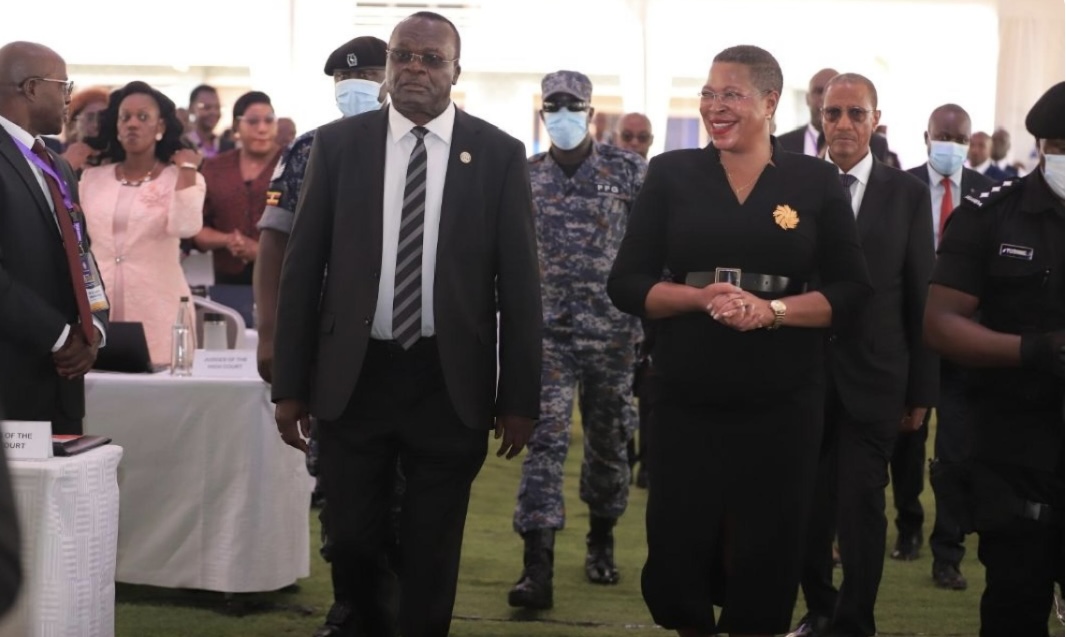President Yoweri Kaguta Museveni has reiterated the National Resistance Army’s (NRA) unwavering position, emphasizing the need for Ugandans to embrace the four ideological principles of the National Resistance Movement (NRM).
Speaking at the 26th Annual Judges Conference in Kampala, the President underscored the importance of patriotism, Pan-Africanism, socio-economic transformation, and democracy in driving Uganda’s development. The conference, held under the theme “Positioning Uganda’s Judiciary to Contribute to Socio-Economic Development,” brought together judges, justices, and key stakeholders to discuss the judiciary’s role in national growth.
Museveni stressed that prosperity is achieved through sustainable production and trade, citing the Banyankore people, who rely on other Ugandans to purchase their goods. He reflected on the NRM’s journey from the bush war to its patient engagement with Ugandans, noting that despite initial resistance, the movement has significantly contributed to peace, stability, and economic growth. The President projected that Uganda’s economy will reach USD 59.3 billion by June 2025, with a long-term goal of hitting USD 500 billion in the coming years.
Museveni also highlighted the role of patriotism in building the Uganda People’s Defence Forces (UPDF), which has played a crucial role in ensuring national and regional stability. In a speech read on his behalf by the Speaker of Parliament, the President reaffirmed the NRA’s commitment to engaging the public in embracing NRM’s core ideological principles.
Chief Justice Alfonse Owiny-Dollo urged judges to uphold their duty by delivering justice with conscience, fairness, and without fear, favor, malice, or ill will. He emphasized that, like doctors who heal lives, judges are conflict-healers, and the public should find trust and peace in their decisions.
His remarks come just days after the Supreme Court’s landmark ruling banning the trial of civilians in military courts. This ruling has sparked public debate and criticism from NRM cadres, including President Museveni, who responded that Uganda is governed by the people, not judges. However, Owiny-Dollo urged judges to fear no man in their adjudication of cases but only God, in whose name justice is rendered.
Museveni, who usually presides over the Judges’ Conference, was notably absent this year. Some speculate that his absence was linked to his dissatisfaction with the Supreme Court ruling. Instead, he delegated the Speaker of Parliament to represent him.
Owiny-Dollo encouraged judges to embrace innovations that enhance speedy and efficient justice, which in turn fosters a secure investment climate and economic growth. He raised concerns over the rising Sexual and Gender-Based Violence (SGBV), land disputes, and domestic violence cases that clog the courts, undermining productivity and national development.
The Chief Justice emphasized the importance of judicial accountability, urging judges to remain transparent and responsible in their service to the people. He also highlighted Alternative Dispute Resolution (ADR) mechanisms, which have successfully expedited dispute resolution and improved access to justice.
Furthermore, Owiny-Dollo called for closer collaboration between the judiciary, executive, and legislature to promote justice and social-economic transformation. The 26th Annual Judges Conference has convened justices from the High Court, Court of Appeal/Constitutional Court, and Supreme Court, alongside judicial officers and stakeholders, to discuss strategies for enhancing access to justice and strengthening the rule of law.
According to Supreme Court Justice Mike Chibita, who chaired the organizing committee, the conference seeks to strengthen the judiciary’s capacity to deliver justice efficiently and equitably. Chibita noted that all legal cases—whether civil or criminal—carry an economic cost, making timely justice delivery essential to national development. He also stressed the importance of improving the public image of the judiciary as outlined in the Judiciary’s Strategic Plan Five.

